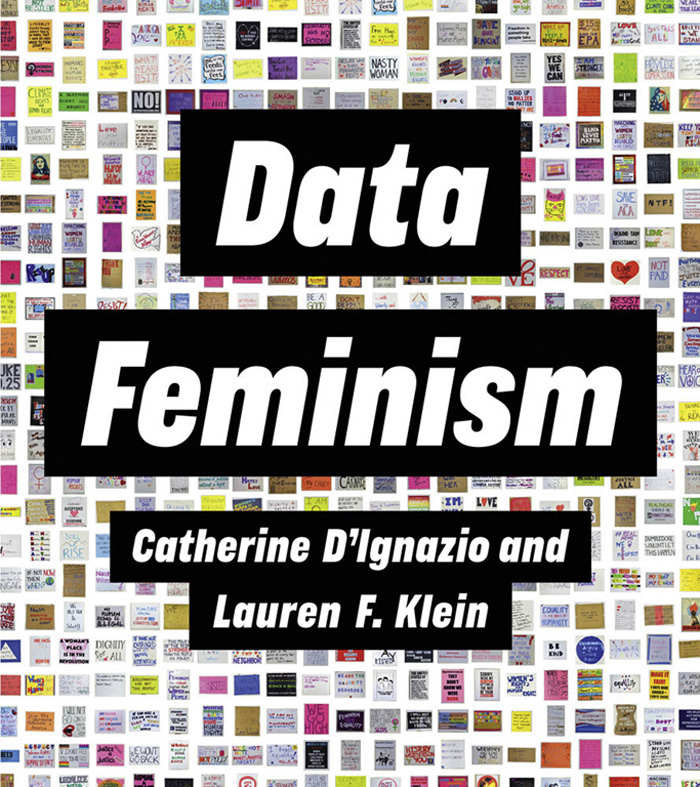Power in numbers
“Let the data speak for themselves” is common advice in some scientific circles. But “the data never speak for themselves,” says Catherine D’Ignazio, SM ’14. “There are always humans and institutions speaking for the data, and different people have their own agendas. The data are never innocent.”
Those are the issues that D’Ignazio, an assistant professor of urban studies and planning, examines in a new book with Lauren Klein, an associate professor at Emory University. In Data Feminism (MIT Press, 2020, $29.95), the authors use the lens of intersectional feminism to scrutinize how data science reflects social structures.

“Intersectional feminism examines unequal power,” they write. “And in our contemporary world, data is power too. Because the power of data is wielded unjustly, it must be challenged and changed.”
D’Ignazio and Klein point to research led by MIT’s own Joy Buolamwini, SM ’17, who observed that a facial recognition program could not “see” her. She found that the software was based on a set of faces that were 78% male and 84% white; only 4% were female and dark-skinned, like herself.
Or consider another example, in which Amazon tested an AI system to screen job applicants. Because a high percentage of company employees were men, the algorithm favored men’s names.
Such problems can be addressed with a more participatory process or more diverse training data, D’Ignazio says, but the question of who participates is “the elephant in the server room.” As of 2011, 26% of all undergraduate computer science degrees in the US went to women, down from 37% in 1985. Lack of diversity, D’Ignazio and Klein believe, blinds many data projects to some facets of the social situations they seek to measure.
Recent books from the MIT community
Paul Samuelson: Master of Modern Economics
By Robert A. Cord, Richard G. Anderson, PhD ’80, and William A. Barnett ’63
PALGRAVE MACMILLAN, 2019, $129
Computing Possible Futures: Model-Based Explorations of “What if?”
By William B. Rouse, SM ’70, PhD ’72
OXFORD UNIVERSITY PRESS, 2019, $38.95
Thomas Wride and Wesley’s Methodist Connexion
By Clive Murray Norris, SM ’92
ROUTLEDGE, 2020, $155
Harold Edgerton: Seeing the Unseen
By Ron Kurtz ’54, ’59, SM ’60; Deborah Douglas, MIT Museum director of collections; Gus Kayafas ’69; J. Kim Vandiver, SM ’69, PhD ’75, professor of mechanical engineering; and Gary Van Zante
STEIDL/MIT MUSEUM, 2019, $50
Advancing the Common Good: Strategies for Businesses, Governments, and Nonprofits
By Philip Kotler, PhD ’56
PRAEGER, 2019, $39
Quantum Legacies: Dispatches from an Uncertain World
By David Kaiser, professor of physics and of the history of science
UNIVERSITY OF CHICAGO PRESS, 2020, $26
The Creative Classroom: Innovative Teaching for 21st-Century Learners
By Keith Sawyer ’82
TEACHERS COLLEGE PRESS, 2019, $31.95
“We want to try to tune people in to these kinds of power relationships,” D’Ignazio says. “Who’s on the team? Who had the idea? Who’s benefiting from the project? Who’s potentially harmed?”
D’Ignazio and Klein outline seven principles of data feminism. Among them: examine and challenge power, rethink binary systems and hierarchies, embrace pluralism, and “value multiple forms of knowledge,” including firsthand knowledge that may contradict official data. Also, we should consider the context in which data are generated, and “make labor visible.” This last principle acknowledges that even when marginalized people contribute to data projects, they often receive less credit.
For all the critiques, D’Ignazio and Klein also include examples of data sets that empower women, such as the WomanStats Project, an academic effort investigating how the security and activities of nation-states affect the security of their women.
“For people who are data people but are new to feminism, we want to provide a very accessible introduction,” D’Ignazio says. For those already versed in feminism, they seek to highlight “the ways data science is problematic, but can be marshalled in the service of justice.”
Send book news to:
MITNews@technologyreview.com or
MIT News
1 Main Street, 13th Floor
Cambridge, MA 02142
Keep Reading
Most Popular
Large language models can do jaw-dropping things. But nobody knows exactly why.
And that's a problem. Figuring it out is one of the biggest scientific puzzles of our time and a crucial step towards controlling more powerful future models.
How scientists traced a mysterious covid case back to six toilets
When wastewater surveillance turns into a hunt for a single infected individual, the ethics get tricky.
The problem with plug-in hybrids? Their drivers.
Plug-in hybrids are often sold as a transition to EVs, but new data from Europe shows we’re still underestimating the emissions they produce.
Stay connected
Get the latest updates from
MIT Technology Review
Discover special offers, top stories, upcoming events, and more.